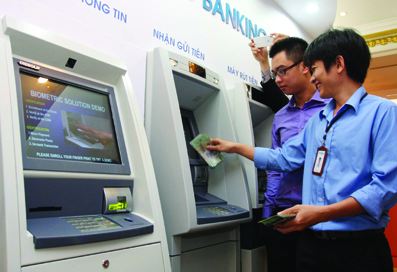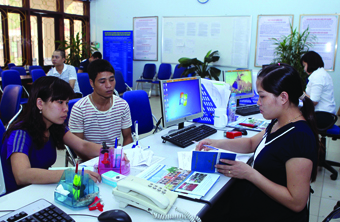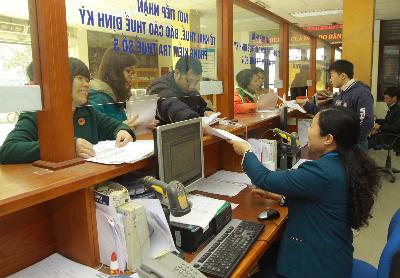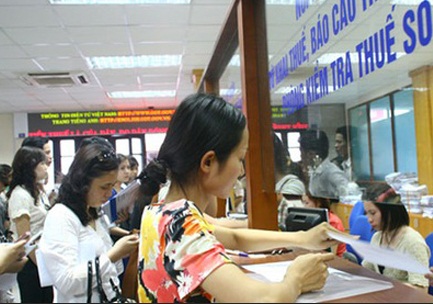* National Assembly resolves on accelerated economic restructuring: On November 26, the National Assembly (NA) issued Resolution No. 10/2014/QH13 aiming to further improve the effectiveness of the economic restructuring through 2015.
Specifically, it requested quantification of the growth model’s objectives, more practical methods of redistribution of the macro-economy’s resources and closer linkage of economic restructuring with international integration and restructuring of industries and services with that of agriculture. It tasked the Government to approve sectoral and local restructuring schemes no later than the second quarter of 2015.
Regulations on public-private partnership in agriculture will be elaborated and introduced to attract more foreign and private sector investment and reduce public (state budget’s) investment, giving the highest incentives to scientific and technological R&D and development of human resources for agriculture.
Plans on reorganization of state enterprises, aiming to separate the function of state capital owners and representatives from state management, and those on utilization of proceeds from equitization and divestment of state capital from non-core business lines to invest in urgent projects and lessen the public debt burden, will be finalized by the Government.
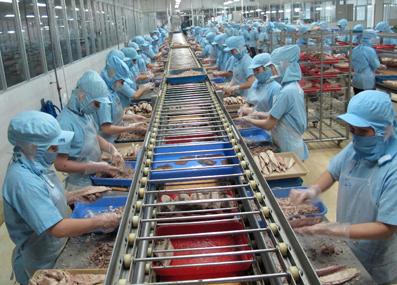 |
Canning tunas for export at KTC Food Company (Kien Giang province)__ Photo: Phuong Vy/VNA |
The Government will also continue applying remedies to reduce non-performing loans to below three percent of total outstanding loans by the end of 2015, finalize the operation mechanism for companies managing assets of credit institutions, and revise regulations on settlement of security assets and development of the debt-trading market.
The issues of risky cross-holding and cross-investment within the banking system will be addressed and suppressed by the end of 2015.
Under the Resolution, the Government will have to work out the 2016-20 economic restructuring plan in line with the 2011-20 socio-economic development strategy and report it to the NA’s 10th session (October 2015).-
* Businesspersons earning annual income worth under VND 100 million to enjoy tax break: Some changes will be enacted from January 1, 2015, under the newly passed Law Revising a Number of Articles of the current Tax Laws, including personal income tax exemption for businesspersons that earn less than VND 100 million a year; removal of the 15-percent cap (for corporate income tax calculation) on enterprises’ expenses for advertising, marketing, sales promotion, guest reception, conference and other expenses directly related to production and business operation; reduction of the current value-added tax rate of five percent to zero for fertilizers, livestock feed, and special-use machinery and equipment for agricultural production.
The new Law abolishes the fine level of 0.07 percent/day on tax amounts paid more than 90 days after the prescribed deadline and applies only the fine of 0.05 percent/day.-
* Five circulars on import duty reduction under FTA commitments in the pipeline: The Ministry of Finance has recently publicized for comment five draft circulars to promulgate preferential import tariffs in implementing the 2015-18 import duty reduction schedule the nation has committed to in the free trade agreements to which it is a member state.
The five tariffs, which will take effect on January 1, 2015, include: Vietnam’s particularly preferential import tariff to implement the ASEAN-the Republic of Korea Free Trade Agreement for the 2015-2018 period; Vietnam’s particularly preferential import tariff to implement the ASEAN-China Free Trade Agreement for the 2015-2018 period; Vietnam’s particularly preferential import tariff to implement the ASEAN Trade in Goods Agreement for the 2015-2018 period; Vietnam’s particularly preferential import tariff to implement the ASEAN-Australia-New Zealand Free Trade Agreement for the 2015-2018 period; and Vietnam’s particularly preferential import tariff to implement the ASEAN-India Free Trade Agreement for the 2015-2018 period.
During 2015-18, the above agreements will see deeper tariff cut and abolition. Particularly, the ASEAN Trade in Goods Agreement, ASEAN-China and ASEAN-the Republic of Korea Free Trade Agreements will enter the final stage of tariff abolition (duty rate zeroing) by 2018.
Following these five circulars, by the end of March 2015, the Ministry of Finance will promulgate the preferential import tariff to implement the ASEAN-Japan and Vietnam-Japan Free Trade Agreements.-
* Permission for foreigners to deposit foreign-currency cash amounts at local banks proposed: At the year-end Vietnam Business Forum 2014 starting on December 2, the Banking Working Group suggested some substantive changes in banking regulations, including abolition of the provision in Article 13 of Decree No. 70/2014/ND-CP on non-permission for foreigners doing business in Vietnam to deposit foreign-currency amounts in cash at Vietnam-based banks, implying that foreign investors have to remit abroad all their lawful incomes.
The Group also suggested revision of regulations on opening of indirect investment capital accounts under the State Bank’s Circular No. 05/2014/TT-NHNN, aiming to permit a foreign investor to conduct indirect investment in Vietnam through several accounts, instead of a sole indirect investment capital account, opened at a licensed bank.
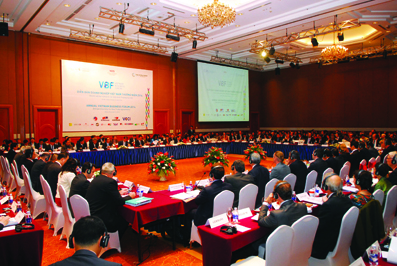 |
Annual Vietnam Business Forum 2014 titled “Entrepreneurship for New Trade Agreements” opened on December 2 in Hanoi__Photo: Danh Lam/VNA |
It argued that large investors usually diversify their investment activities and need to open many accounts (under a sole client identification number) at a bank to separately manage each investment activity. This totally conforms to international banking standards and would still ensure the State Bank’s management of total indirect investment capital because all account balances would be accounted under the sole client identification number.
Also at the forum, the Capital Market Working Group reiterated its proposals which have not yet been converted into actual regulatory changes, including permission for foreign investors to hold up to under 100 percent (i.e., 99 percent) of equity of listed companies not engaged in sectors subject to restrictions or conditional business, fund management companies and securities companies (including public companies), from current 49 percent, in order to increase the market capitalization size with foreign long-term capital under Vietnam’s WTO commitments.
It also repeated the proposal on pilot issuance of non-voting depository receipts (NVDR), a trading instrument originally issued in Thailand, within 20 percent of total listed shares in order to improve the liquidity of the stock market.
In response to these proposals, State Securities Commission (SSC) Chairman Vu Bang reaffirmed the Government’s policy to attract more and more foreign indirect investment in Vietnamese securities and informed that the SSC would raise the bar from 49 to 60 percent soon.
Pending a decree revising Decree No. 58/2012/ND-CP detailing the Securities Law (expected to be issued in 2015), the SSC was currently working on a decision to replace Prime Minister Decision No. 55/2009/QD-TTg, on holding rate of foreign investors on the Vietnamese stock market, Bang said.
The Group also proposed the SSC to synchronize the current two different days T+2 (for sale and transfer of securities) and T+3 (for payment for purchased securities) into the same day of T+2 for foreign investors’ convenient management and monitoring of their transactions on Vietnam’s stock market, and to consider lifting the requirement of consular legalization of documents in dossiers of application for securities trading codes to help foreign investors save time and costs.-
* Private business, foreign-invested sectors key to prosperity of the whole economy: For the first time, at both the Vietnam Business Forum (VBF) 2014 and the Vietnam Development Partnership Forum starting on December 5 in Hanoi, the development of the private economic sector was discussed as the hottest topic.
VBF’s Investment and Trade Working Group and AmCham Chairman Gaura Gupta regarded private enterprises, domestic and foreign, as the main driving force for the national economic development, and urged removal of regulatory barriers concerning land use rights in industrial parks, labor cost, promotion of support industries and creation of favorable conditions for them, especially small- and medium-sized ones, to build brands and join the global value chain.
Regarding foreign-invested sector, Tran Anh Duc, head of VBF’s Investment and Trade Working Group, suggested removal of the requirement that investors must show their investment certificates when purchasing shares of Vietnamese enterprises. Such a certificate should only be required for investors doing business in conditional sectors or wishing to purchase 51 percent or more of total shares of a Vietnamese enterprise, he said.
According to Minister of Planning and Investment Bui Quang Vinh, domestic private enterprises, especially those engaged in support industries, have been receiving special support from the Government and growing fast though they still need legal assistance to build brands, grab commercial opportunities from the global value chain, and connect themselves with foreign-invested enterprises.
Regarding real estate business, David Lim, head of the Land Working Group, requested an explanatory guidance on two provisions that he found contradictory: The Real Estate Business Law prescribes that a foreign investor that wishes to implement a project to develop commercial houses for the first time or receive a transferred housing project must possess an investment certificate; meanwhile, the Investment Law requires a foreign investor that conducts investment activities in Vietnam for the first time to have or receive a transferred investment project to be granted an investment certificate.-
